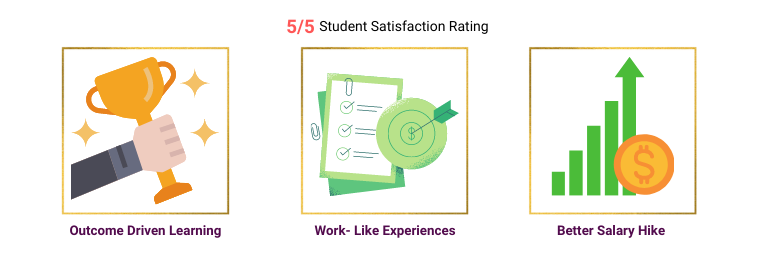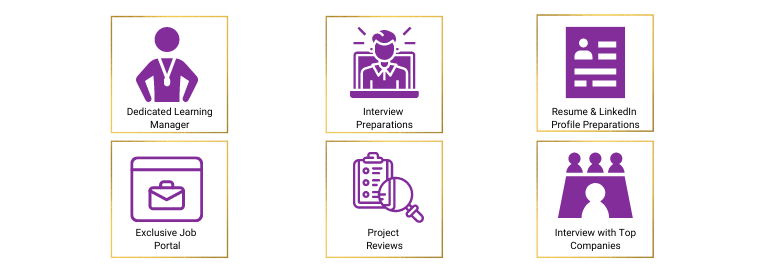Data Science with Python Online Training
Data Science with Python course will enable you to learn these concepts from scratch and help you master important Python programming concepts such as data operations, file operations, object-oriented programming, and various Python libraries such as Pandas, Numpy, Matplotlib essential for Data Science. This Python for Data Science certification training will also make you understand the different types of Machine Learning, The Data Science with Python certification course provides a complete overview of Python’s Data Analytics tools and techniques. Learning Python is a crucial skill for many Data Science roles. Acquiring knowledge in Python will be the key to unlock your career as a Data Scientist.
In collaboration with
Online Class
Projects
Hands-On
n/a

40 Hrs Instructor-led Training
Mock Interview Session
Project Work & Exercises
Flexible Schedule
24 x 7 Lifetime Support & Access
Certification and Job Assistance



Course Benefits




Data Science with Python Online Training Course Overview
1-Python Distribution
Anaconda, basic data types, strings, regular expressions, data structures, loops, and control statements.
2-User-defined functions in Python
Lambda function and the object-oriented way of writing classes and objects.
3-Datasets and manipulation
Importing datasets into Python, writing outputs and data analysis using Pandas library.
4-Probability and Statistics
Data values, data distribution, conditional probability, and hypothesis testing.
5-Advanced Statistics
Analysis of variance, linear regression, model building, dimensionality reduction techniques.
6-Predictive Modelling
Evaluation of model parameters, model performance, and classification problems.
7-Time Series Forecasting
Time Series data, its components and tools.
- Professionals in the field of data science
- Professionals looking for a robust, structured Python learning program
- Professionals working with large datasets
- Software or data engineers interested in quantitative analysis
- Data analysts, economists, researchers
You don’t need any specific knowledge for this Data Science with Python course. Though, a basic knowledge of programming can help.
Mentors Pool follows a rigorous certification process. To become a certified Data Science with Python , you must fulfill the following criteria:
- Online Instructor-led Course:
- Successful completion of all projects, which will be evaluated by trainers
- Scoring a minimum of 60 percent in the Data science with Python quiz conducted by Mentors Pool
Data Science has bagged the top spot in LinkedIn’s Emerging Jobs Report for the last three years. Thousands of companies need team members who can transform data sets into strategic forecasts. Acquire in-demand data science and Python skills and meet that need.
Data Science and AI have taken the centre-stage as more and more brands realise the possibilities of these tools in the post-COVID world. The demand for data engineers was up 50% and the demand for data scientists was up 32% in 2020 compared to the prior year. The average salary for a data scientist in the U.S. is $96,494 per year and the demand for data scientists is pegged to grow by 16% between 2020 and 2028, a rate that’s faster than the average for all occupations (PayScale).
Capitalize on the demand for the ‘hottest job of the 21st century’ with a program primed for industry relevance.
Talk to Us
IN: +91-8197658094
The median salary for an experienced Data Scientist is $1628,00 – Zip Recuriter, According to the TIOBE index, Python is one of the most popular programming languages in the world, According to the U.S. Bureau of Labor Statistics there will be around 11.5 million new jobs for Data Science professionals by 2026
Fees
Online Classroom
- 40 Hrs of Instructor-led Training
- 1:1 Doubt Resolution Sessions
- Attend as many batches for Lifetime
- Flexible Schedule
Batches
Dates
Days
Timings
Enrolment validity: Lifetime
Login
EMI Option Available with different credit cards
Cart
Corporate Training
- Customised Learning
- Enterprise grade learning management system (LMS)
- 24x7 Support
- Enterprise grade reporting
Course Content
Data Science with Python Online Training Course Content
Learning Objectives: In this Data Science with Python training course module you will get a brief idea of what it is and touch on the basics.
- Overview
- The Companies using Python
- Different Applications where it is used
- Discuss Python Scripts on UNIX/Windows
- Values, Types, Variables
- Operands and Expressions
- Conditional Statements
- Loops
- Command Line Arguments
- Writing to the screen
- Creating “Hello World” code
- Variables
- Demonstrating Conditional Statements
- Demonstrating Loops
Skills:
- Fundamentals of Python programming
Learning Objectives: Learn different types of sequence structures, related operations and their usage. Also learn diverse ways of opening, reading, and writing to files.
- Python files I/O Functions
- Numbers
- Strings and related operations
- Tuples and related operations
- Lists and related operations
- Dictionaries and related operations
- Sets and related operations
- Tuple – properties, related operations, compared with a list
- List – properties, related operations
- Dictionary – properties, related operations
- Set – properties, related operations
Skills:
- File Operations using Python
- Working with data types of Python
Learning Objectives: In this Python Data Science course module, you will learn how to create generic scripts, how to address errors/exceptions in code, and finally how to extract/filter content using Regex.
- Functions
- Function Parameters
- Global Variables
- Variable Scope and Returning Values
- Lambda Functions
- Object-Oriented Concepts
- Standard Libraries
- Modules Used in Python
- The Import Statements
- Module Search Path
- Package Installation Ways
- Errors and Exception Handling
- Handling Multiple Exceptions
- Functions – Syntax, Arguments, Keyword Arguments, Return Values
- Lambda – Features, Syntax, Options, Compared with the Functions
- Sorting – Sequences, Dictionaries, Limitations of Sorting
- Errors and Exceptions – Types of Issues, Remediation
- Packages and Module – Modules, Import Options, sys Path
Skills:
- Error and Exception management in Python
- Working with functions in Python
Learning Objectives: This Module of Data Science with Python course helps you get familiar with basics of statistics, different types of measures and probability distributions, and the supporting libraries that assist in these operations. Also, you will learn in detail about data visualization.
Topics:
- NumPy – arrays
- Operations on arrays
- Indexing slicing and iterating
- Reading and writing arrays on files
- Pandas – data structures & index operations
- Reading and Writing data from Excel/CSV formats into Pandas
- matplotlib library
- Grids, axes, plots
- Markers, colours, fonts and styling
- Types of plots – bar graphs, pie charts, histograms
- Contour plots
- NumPy library- Creating NumPy array, operations performed on NumPy array
- Pandas library- Creating series and dataframes, Importing and exporting data
- Matplotlib – Using Scatterplot, histogram, bar graph, pie chart to show information, Styling of Plot
Skills:
- Probability Distributions in Python
- Python for Data Visualization
Learning Objective: Through this Module of data science training, you will understand in detail about Data Manipulation.
- Basic Functionalities of a data object
- Merging of Data objects
- Concatenation of data objects
- Types of Joins on data objects
- Exploring a Dataset
- Analysing a dataset
- Pandas Function- Ndim(), axes(), values(), head(), tail(), sum(), std(), iteritems(), iterrows(), itertuples()
- GroupBy operations
- Aggregation
- Concatenation
- Merging
- Joining
Skills:
- Python in Data Manipulation
Learning Objectives: In this module, you will learn the concept of Machine Learning and its types.
- Revision (numpy, Pandas, scikit learn, matplotlib)
- What is Machine Learning?
- Machine Learning Use-Cases
- Machine Learning Process Flow
- Machine Learning Categories
- Linear regression
- Gradient descent
- Linear Regression – Boston Dataset
- Machine Learning concepts
- Machine Learning types
- Linear Regression Implementation
Learning Objectives: In this module of data science training, you will learn Supervised Learning Techniques and their implementation, for example, Decision Trees, Random Forest Classifier etc.
- What are Classification and its use cases?
- What is Decision Tree?
- Algorithm for Decision Tree Induction
- Creating a Perfect Decision Tree
- Confusion Matrix
- What is Naïve Bayes?
- How Naïve Bayes works?
- Implementing Naïve Bayes Classifier
- What is Support Vector Machine?
- Illustrate how Support Vector Machine works?
- Hyperparameter Optimization
- Grid Search vs Random Search
- Implementation of Support Vector Machine for ClassificationWhat is Random Forest?
Hands On/Demo:
- Implementation of Logistic regression
- Decision tree
- Random forest
- Implementation of Naïve Bayes, SVM
- Supervised Learning concepts
- Implementing different types of Supervised Learning algorithms
- Evaluating model output
Learning Objectives: In this module of Data Science Python, you will learn about Unsupervised Learning and the various types of clustering that can be used to analyze the data.
- What is Clustering & its Use Cases?
- What is K-means Clustering?
- How does K-means algorithm work?
- How to do optimal clustering
- What is C-means Clustering?
- What is Hierarchical Clustering?
- How Hierarchical Clustering works?
- Implementing K-means Clustering
- Implementing Hierarchical Clustering
- Unsupervised Learning
- Implementation of Clustering – various types
Learning Objectives: In this Data Science with Python Training module, you will learn about the impact of dimensions within data. You will be taught to perform factor analysis using PCA and compress dimensions. Also, you will be developing an LDA model.
- Introduction to Dimensionality
- Why Dimensionality Reduction
- PCA
- Factor Analysis
- Scaling dimensional model
- LDA
- PCA
- Scaling
- Implementing Dimensionality Reduction Technique
Learning Objectives: In this Python Data Science Course module, you will learn about developing a smart learning algorithm such that the learning becomes more and more accurate as time passes by. You will be able to define an optimal solution for an agent-based on agent-environment interaction.
- What is Reinforcement Learning
- Why Reinforcement Learning
- Elements of Reinforcement Learning
- Exploration vs Exploitation dilemma
- Epsilon Greedy Algorithm
- Markov Decision Process (MDP)
- Q values and V values
- Q – Learning
- α values
- Calculating Reward
- Discounted Reward
- Calculating Optimal quantities
- Implementing Q Learning
- Setting up an Optimal Action
- Implement Reinforcement Learning using python
- Developing Q Learning model in python
Learning Objectives: In this module of Data Science with Python course, you will learn Association rules and their extension towards recommendation engines with Apriori algorithm.
- What are Association Rules?
- Association Rule Parameters
- Calculating Association Rule Parameters
- Recommendation Engines
- How does Recommendation Engines work?
- Collaborative Filtering
- Content-Based Filtering
- Apriori Algorithm
- Market Basket Analysis
- Data Mining using python
- Recommender Systems using python
Learning Objectives: In this Python for Data Science Certification module, you will learn about Time Series Analysis to forecast dependent variables based on time. You will be taught different models for time series modeling such that you analyze a real time-dependent data for forecasting.
- What is Time Series Analysis?
- Importance of TSA
- Components of TSA
- White Noise
- AR model
- MA model
- ARMA model
- ARIMA model
- Stationarity
- ACF & PACF
- Checking Stationarity
- Converting a non-stationary data to stationary
- Implementing Dickey-Fuller Test
- Plot ACF and PACF
- Generating the ARIMA plot
- TSA Forecasting
- TSA in Python
- What is Model Selection?
- The need for Model Selection
- Cross-Validation
- What is Boosting?
- How Boosting Algorithms work?
- Types of Boosting Algorithms
- Adaptive Boosting
- Cross-Validation
- AdaBoost
- Model Selection
- Boosting algorithm using python
Course Projects
Netflix Recommendation System
In this project you will learn how Netflix uses machine learning and algorithms to help break viewers' preconceived notions and find shows that they might not have initially chosen. To do this, it looks at nuanced threads within the content, rather than relying on broad genres to make its predictions. It also assist learner to use several machine learning algorithms.
Python Web Scraping for Data Science
The learner will use Python Programming to efficiently perform web scraping. Get practical experience in working on various web scraping libraries, Beautiful soup, NavigableString, parser, searching tree deployment, and more.
OOPS in Python
Create multiple method using OOPs such as check_balance in an account , withdraw to withdraw an amount and override it to ensure that minimum balance is maintained. Also work with parameterization and classes.
Course Certification
In 2012, Harvard Business Review dubbed Data Scientist the sexiest job of the 21st Century. Companies like Google, Facebook and others collect user data and sell them to ad companies to earn profits. How do you think they know whether you like dogs or cats? How do you think Amazon knows what products to recommend to you even when they haven’t explicitly asked you about it? The answer is data. Some other major reasons why data science is popular are:
- Data-driven decision making is increasing in demand.
- Due to the lack of well-trained data scientists, professionals trained in data science are offered the highest salary in the tech world.
- Data is being collected at an exceptionally high rate, which requires an equal rate of analysis Which are the global cities in which Mentors Pool conducts Data Science with Python certification training? to make the most of it. Data scientists can help a company take crucial marketing decisions based on their findings from raw data.
There are many benefits to being in the job declared as the ‘Sexiest job of the 21st century’ by Harvard Business review:
- High Pay: First things first, we all expect high pay from a job, especially when the qualification bar is set incredibly high. Due to high demand and low supply, data scientist jobs are one of the highest paying jobs in the IT industry today.
- Good bonuses: Although it is a part of their pay, data scientists can expect impressive bonuses. Other perks may include equity shares and signing perks.
- Education: By the time you become a data scientist, you would probably be having either a Masters or a PhD due to the demand for knowledge in this field. You could receive offers to work as a lecturer or as a researcher for governmental as well as private institutions.
- Mobility: Many businesses that collect data are mostly located in developed countries. Getting a job in one would fetch you a hefty salary as well as raise your standard of living.
- Network: Your involvement in the tech world through research papers in international journals, tech talks at conferences and many more platforms would help expand your network of data scientists. This, in turn, can be used for referral purposes as well.
Most data scientists have a PhD or master’s degree, which clearly indicates how competitive this field is. Having a certification in data science can have a great impact on your overall profile. We have compiled a list of some of the best and popular certifications for you:
- Data Science with Python from Mentors Pool
- Applied AI with Deep Learning, IBM Watson IoT Data Science Certificate
- Cloudera Certified Associate – Data Analyst
- Cloudera Certified Professional: CCP Data Engineer
- Microsoft Certified Solutions Expert
- Dell EMC Proven Professional
Data science is a huge field and covering everything about data science is not possible. So it is highly advised to decide what is your area of interest in this field. There are two ways to decide what kind of data science course you want to pursue:
- Enroll yourself in data science courses to see which topics interest you and which topics are extremely difficult to understand.
- Implement your data science skills. Through thorough implementation, you can find which step of the data science phase of the project interests you more.
We have compiled our learning path in logical sequence to help you delve into it successfully.
- Getting started
- Mathematics
- Libraries
- Data visualization
- Data preprocessing
- Machine Learning and Deep Learning
- Natural Language processing
- Polishing skills
- Getting started: Choose a programming language in which you are comfortable. We suggest Python or R language. Understand what data science actually means and the roles and responsibilities of a data scientist.
- Mathematics: Data science is all about making sense of raw data, finding patterns and relationship between them and finally representing them, which is why it is crucial that you have a good command over both mathematics as well as statistics. Therefore, we have compiled some of the topics which you can pay special attention to:
- Descriptive statistics
- Probability
- Linear algebra
- Inferential statistics
- Libraries: Data science process involves various tasks ranging from preprocessing the data given to plotting the structured data and finally to applying ML algorithms as well. Some of the famous libraries are:
- Scikit-learn
- SciPy
- NumPy
- Pandas
- ggplot2
- Matplotlib
- Data visualization: It’s your job to make sense of the data given to you by finding patterns and making it as simple as possible. The most popular way to visualize data is by creating a graph. There are various libraries that can be used for this task:
- Matplotlib – Python
- Ggplot2 – R
- Data preprocessing: Due to the unstructured form of data, it becomes necessary for data scientists to preprocess this data in order to make it analysis-ready. Preprocessing is done using feature engineering and variable selection. After preprocessing, our data would be in a structured form and ready to be injected into ML tool for analysis.
- ML and Deep learning: Having deep learning skills to go along with basic ML skills on the CV is a must for every data scientist. For data analysis, deep learning is highly preferred as deep learning algorithms are designed to work when you have to deal with a huge set of data. It is recommended that you spend a few weeks on topics like neural networks, CNN, and RNN as well.
- Natural Language processing: Every data scientist should be an expert in NLP as it involves processing of text form of data and its classification as well.
- Polishing skills: Competitions like Kaggle etc. provide some of the best platforms to exhibit your data science skills. Apart from online competitions, you can keep on experimenting and exploring the field by creating your own projects as well.
The Data Science with Python course has been thoughtfully designed to make you a dependable Data Scientist ready to take on significant roles in top tech companies. At the end of the course, you will be able to:
- Build Python programs: distribution, user-defined functions, importing datasets and more
- Manipulate and analyse data using Pandas library
- Data visualization with Python libraries: Matplotlib, Seaborn, and ggplot
- Distribution of data: variance, standard deviation, interquartile range
- Calculating conditional probability via Hypothesis Testing
- Analysis of Variance (ANOVA)
- Building linear regression models, evaluating model parameters, and measuring performance metrics
- Using Dimensionality Reduction Technique
- Building Binomial Logistic Regression models, evaluating model parameters, and measuring performance metrics
- Building KNN algorithm models to find the optimum value of K
- Building Decision Tree models for both regression and classification problems
- Build Python programs: distribution, user-defined functions, importing datasets and more
- Manipulate and analyse data using Pandas library
- Visualize data with Python libraries: Matplotlib, Seaborn, and ggplot
- Build data distribution models: variance, standard deviation, interquartile range
- Calculate conditional probability via Hypothesis Testing
- Perform analysis of variance (ANOVA)
- Build linear regression models, evaluate model parameters, and measure performance metrics
- Use Dimensionality Reduction
- Build Logistic Regression models, evaluate model parameters, and measure performance metrics
- Perform K-means Clustering and Hierarchical Clustering
- Build KNN algorithm models to find the optimum value of K
- Build Decision Tree models for both regression and classification problems
- Build data visualization models for Time Series data and components
- Perform exponential smoothing
Certification Course Reviews
Certification Course FAQs
Below are the top 4 behavioural traits of a successful Data Scientist –
- Curiosity – Since they are dealing with massive amounts of data every single day, they should have an undying hunger for knowledge to keep them going.
- Clarity – Data Science is for you if you find yourself constantly asking “why” and “so what”. Whether cleaning up data or writing code, you should know what you are doing and why you’re doing it.
- Creativity – Creativity in data science can be anything from finding innovative ways to visualize data, development of new tools or new modeling features. You need to be able to figure out what’s missing and what needs to be included in order to get results.
- Skepticism – This is the differentiator between other creative minds and a data scientist. Data scientist need skepticism to keep their creativity in check. Skepticism keeps them in the real world rather than letting them getting carried away with creativity.
We live in a world of data. Your medical diagnosis is data, your investment in the stock market is data, your browsing history is data and so on. Most companies collect data for their own benefit and these data tend to improve our customer experience also. The data science job offered by companies determines what kind of companies they are:
- Small companies use Google Analytics for their analysis as they have fewer resources and fewer data to work with.
- Mid-size companies have data but would need someone to apply ML techniques on it to leverage it.
- Big companies already have teams of data scientists, so they would be needing a new data scientist with specialization. For eg: Visualization, ML expert etc.
Pandas and NumPy are two of the most used Python libraries for data manipulation. Most of the times they are used in a single project. Although Pandas is a library build directly off from NumPy, there are some differences between both of them.
|
Differences |
Pandas |
NumPy |
|
Data input |
Tabular form – CSV or SQL formats |
Numerical data |
|
Main feature |
Helps add, edit, or create columns or rows to the table. |
Helps perform multiple operations on Array. |
|
Building block |
Series which is built off from ndArrays of NumPy. |
ndArrays – Allow mathematical operations to be vectorized and when compared to Python lists, they are stored with much better efficiency. |
|
Ways to access data |
We can use labeled data – integers as well as numbers to label the elements of the series object. |
Only integers are used for labeling the elements. |
Due to high demand and low supply in case of data scientists in the industry, the expectations from them are also high. However, this means that the recognition and career benefits (like salary) are exceptionally high as well. If you are aspiring to be a data scientist then we have compiled key points, which the employers generally look for in data scientists while hiring:
- Education: Most of the data scientists are Masters and PhDs in the field so it is essential that you acquire higher education if you aim to be a data scientist. Getting certified also adds to it.
- Programming: Data science is a field of computer science in general so it goes without question that your programming skills determine how well you can handle the job.
- Libraries/Tools: Programming languages are a basic platform upon which there are libraries and tools built which in turn help you in preparing, analysis, as well as visualization of data.
- Machine Learning: After preparing the data, deep learning is to be applied to it to analyze the patterns and find a relationship in it. Having ML skills is a must.
- Projects: Projects help provide proof of your skills and they help to determine your strong points and interests which in turn helps you to explore this field as well.
- Communication: Data scientist communicates not only within their own team of data scientists but with other non-tech people such as Sales team, marketing team etc. who do not understand technical language. It is, therefore, imperative that a data scientist is able to explain his/her findings in a simple way.
Data Science deals with identification, representation, and extraction of meaningful information, so any programming language equipped with tools to do these tasks efficiently will be naturally popular. Python is one such popular language and the reasons for the same include:
- Short learning curve: Unlike its competitor, R, Python is comparatively easy and quick to learn due to its readable and easy-to-understand syntax.
- Scalability: YouTube migrated to Python due to its efficient scaling capabilities. As compared to its competitors – R, MATLAB etc., Python has a significant lead in scalability due to the flexibility it provides during problem-solving.
- Libraries: Python is the leading language for machine learning projects due to the packages it offers to the developers. Packages like pandas, scikit-learn, etc. allow for ML algorithms to be applied to the data easily.
- Data visualization: With the help of matplotlib, Python enables us to plot complex data representations into 2D plots. Data visualization is a significant process in the job of a data scientist. With the help of Seaborn, ggplot etc. along with matplotlib, Python provides us with a great data visualization tool.
There are many factors that make a program a success. Like every other educational field, the advancement in Data Science also depends on multiple reasons.
- Starting with the very basic question, are you a beginner, an intermediate learner or someone with deep prior knowledge i.e. an expert? If you’re a beginner who joins an expert program, everything will go over your head. And if you’re an expert, joining a beginner’s class would feel like a waste of time and money since you’re probably aware of whatever that’s being taught.
- Once you know what your current level is, the next question is what kind of learner are you? Whether you prefer the traditional classroom coaching where you follow a certain schedule with a specific timing or you prefer the independent style that the online coaching offers.
- Again, one of the most important factors is money and time. Since there are endless options, you must decide which one you want according to your needs.
- Always remember to check the reviews or talk to current or ex-students of the program, they will help you understand how the program can really help.
- Also, before joining a full-fledged program, make sure to try a free course. It will help you firm your decision whether you are really into data science or not.






